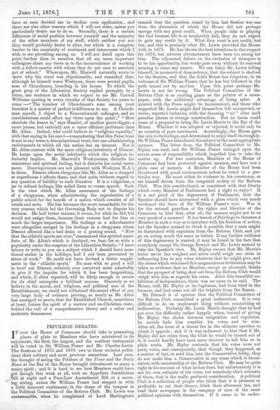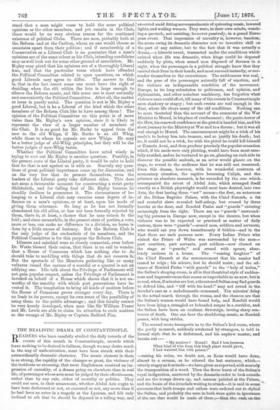PRIVILEGE DEBATES.
IF ever the House of Commons should take to presenting pieces of plate to Members who have ministered to its enjoyment, the first, the largest, and the costliest testimonial will be voted to Sir William Fraser and Mr. Charles Lewis. The Sessions of 1875 and 1876 owe to these eminent politi- cians their solitary and most precious sensations. Last year, the thought of seeing the Printers of the Times and the Daily News at the Bar of the House brought refreshment to many a weary spirit ; and it is hard to see how Members could have got though this week at all, with an Appellate Jurisdiction _13ill at night and a Poor-Law Amendment Bill at a morn- ing sitting, unless Sir William Fraser had stepped in with a little innocent excitement, in the shape of the tempest in the Political Committee of the Reform Club. Mr. Lewis was unreasonable, when he complained of Lord Hartington's remark that the question raised by him last Session was one from the discussion of which the House did not perhaps emerge with any great credit. When people take to playing the fool because life is so intolerably dull, they do not expect to gain any credit by it. What they want is not credit, but fun, and this is precisely what Mr. Lewis provided the House with in 1875. He has shown the best intentions in this respect for 1876, but adverse circumstances have been too strong for him. The adjourned debate on the exclusion of strangers is to be his opportunity, but weeks pass away without its renewal seeming to come any nearer. We can fancy Mr. Lewis telling himself, in moments of despondency, that the subject is shelved for the Session, and that the fickle House has forgotten, in its welcome of Sir William Fraser, that he has but followed in the path traced out by another. Upon this point perhaps Mr. Lewis is not far wrong. The Political Committee of the Reform Club is as exciting game as the printer of a news- paper, with the additional advantage of being safer. A quarrel with the Press might be inconvenient, and those who supported Mr. Lewis might find themselves left unreported, or worse, reported verbatim, with the damning "sic" after each peculiar phrase or strange construction. But no harm could come of a proposal to bring Mr. Lewis Morris to the Bar of the House. Whether it was adopted or rejected, it could only be an occasion of pure merriment. Accordingly, the House gave the rein to its feelings, and determined to enjoy itself thoroughly. Sir William Fraser introduced the subject in the most appropriate manner. The letter from the Political Committee to Mr. Ripley was read, and Sir William Fraser enlarged upon the severe sense of responsibility which impelled him to take the matter up. For two centuries, Members of the House of Commons had been protected against menace, and here was a plain case of menace. A Member of the House had been threatened with penal consequences unless he voted in a par- ticular way. He must either do violence to his conscience, or see himself driven from the congenial society of the Reform Club. Was this constitutional, or consistent with that liberty which every Member of Parliament had a right to enjoy ? It is a sad proof of the degeneracy of Parliament, that the Speaker should have interposed with a gloss which very much weakened the force of Sir William Fraser's text. Was it for the natural guardian of the rights and liberties of the Commons to hint that, after all, the menace might not be so very much of a menace? It is a breach of Privilege to threaten a Member in such a way as to interfere with his freedom of action, but the Speaker seemed to think it possible that a man might be threatened with expulsion from the Reform Club, and yet go on acting much the same as before. If any further evidence of this degeneracy is wanted, it may be found in the fact that everybody except Sir George Bowyer and Mr. Lewis seemed to take the Speaker's view. Mr. Ripley swears that Mr. Morris's letter -never has weighed and never could weigh one atom in influencing him in any votes whatever that he might give, and the cheers which welcomed this magnanimous declaration may be taken as evidence that no Member, except as aforesaid, thinks that the prospect of being shut out from the Reform Club would weigh with him as regards his votes. After this beautiful ex- hibition of independence, there was no more to be said. The House, with Mr. Ripley as its fugleman, had been tried in the furnace, and had come out all the brighter from the flames.
Mr. Disraeli is of opinion that the Political Committee of the Reform Club committed a great indiscretion. It is very difficult to do an unpleasant thing without committing an indiscretion. Probably Mr. Lewis Morris thought that he had got over the difficulty rather happily when, instead of giving Mr. Ripley the choice between resignation and expulsion, he merely bade him consider his votes, and be wise. After all, the force of a threat lies in the ultimate sanction to which it appeals ; and if it was indiscreet to hint that if Mr. Ripley did not retire from the Club he would be turned out of it, it would hardly have been more discreet to tell him so in plain words. Mr. Ripley contends that his votes were not party votes, and consequently, that though they happened, as a matter of fact, to send him into the Conservative lobby, they do not make him a Conservative in any sense which is incon- sistent with membership of the Reform Club. He may be quite right in his account of what he has done, but unfortunately it is not his own estimate of his votes, but somebody else's estimate of them, that is the really pertinent consideration. A political Club is a collection of people who think that it is pleasant or profitable to eat their dinner, drink their afternoon tea, and read their newspaper in the company of men of the same political opinions with themselves. If it came to be under- stood that a man might cease to hold the same political opinions as the other members, and yet remain in the Club, there would be no very obvious reason for the continued existence of political Clubs. There are men, probably both at the Deform and at the Carlton, whom no one would choose as associates apart from their politics ; and if membership of a Conservative or a Liberal Club is no guarantee that a man's opinions are of the same colour as his Club, intending candidates may as well look out for some other ground of association. Mr. Ripley may plead that his opinions are of a thoroughly Liberal hue, and that the particular votes which have offended the Political Committee related to open questions, on which good Liberals may agree to differ. The answer to this is, that in the last resort some one must have the right of deciding when the rift within the lute is large enough to silence the Reform music, and this some one is most naturally and conveniently the Political Committee. After all, the matter at issue is purely social. The question is not is Mr. Ripley a good Liberal, but is he a Liberal of the kind which the other members of the Reform Club like to have among them ? The opinion of the Political Committee on this point is of more value than Mr. Ripley's own opinion, since it is likely to represent the view of a. larger number of members of the Club. It is no good: for Mr. Burke to appeal from the new to the old Whigs, if Mr. Barke is an old Whig, while those to whom he, appeals are new Whigs. He may be a better judge of old-Whig principles, but they will be the better judges of new-Whig tastes.
Whether the Political Committee have acted wisely in trying to cast out Mr. Ripley is another question. Possibly, in the present state of the Liberal party, it would be safer to hold that he that is not against us is with us. Scarcely any ques- tions of great political importance come up for discussion, and on the very few 'that do present themselves, even the leaders of the Liberal party take different sides. This does not seem a favourable moment for constructing a strict party Shibboleth, and for falling foul of Mr. Ripley because he steadily declines to pronounce it. The circumstance of be- longing to a Liberal club may exercise some degree of in- fluence on a man's opinions, or at least, upon his mode of giving them utterance. So long as he has not formally abandoned his old allies, or has not been formally rejected by them, there is, at least, a chance that he may return to the fold ; and since meanwhile, in the present state of parties, a vote, more or less, can make no difference to a division, no harm is done by a little excess of leniency. But the Reform Club is the only , judge of the credentials of its members, and the Political Committee is for this purpose the Reform Club.
Idleness and mischief were so closely connected, even before Dr. Watts blessed their union, that there is no call to wonder, that a House of Commons which has nothing else to do: should take to meddling with things that do not concern it,: But the spectacle of the Members gathering like so many vultures round the carcass of a scandal or a quarrel is not an edifying one. Idle talk about the Privilege of Parliament will not gain popular respect, unless the Privilege of Parliament is invoked on behalf of a House which shows that it is not un- worthy of the sanctity with which past generations have in- vested it. The temptation to bring all kinds of matters before the House of Commons grows stronger every day. There is no limit to its powers, except its own sense of the possibility of using them to the public advantage ; and this faculty cannot be very keenly developed, when men like Sir William Fraser and Mr. Lewis are able to claim its attention to such matters as the wrongs of Mr. Ripley or Captain Bedford Pim.



































 Previous page
Previous page